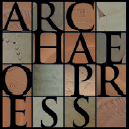
Publishing Scholarly Archaeology since 1997

Download Sample PDF
H 290 x W 205 mm
160 pages
60 figures, 5 tables (colour throughout)
Published Sep 2024
ISBN
Paperback: 9781803278056
Digital: 9781803278063
Keywords
Bronze Age; Neolithic; Exchange; South Asia; Africa; Eastern Mediterranean; Indus; Aegean
Related titles





There and Back Again: Afro-Eurasian Exchange in the Neolithic and Bronze Age Periods
Edited by Marie Nicole Pareja, Robert Arnott
Paperback
£35.00
Includes PDF
PDF eBook
(personal use)
£16.00
PDF eBook
(institutional use)
£35.00
This book evaluates the evidence for indirect connections between the Aegean and the Indus extending back to the third and fourth millennia BCE, particularly commodities such as tin and lapis lazuli, and discusses recently discovered objects, new methods of materials analysis techniques and topics, as well as iconographic investigation.
Contents
Foreword: Old Assumptions Die Hard – Shereen Ratnagar
Introduction – Marie Nicole Pareja, Robert Arnott
Chapter 1: Crossing Continents: between the Indus and the Aegean in prehistory – Robert Arnott
Chapter 2: Indus-Aegean Interaction in the 3rd millennium BC – Geoffrey E. Ludvik, J. Mark Kenoyer
Chapter 3: Junction Points: New Evidence for Long-Distance Trade between Minoan Crete and the East – Susan C. Ferrence, Alessandra Giumlia-Mair, Philip P. Betancourt, Metaxia Tsipopoulou
Chapter 4: Fierce Femmes: On the Syncretic Nature of the Bronze Age Divine in Afro-Eurasia – Marie N. Pareja
Chapter 5: The Iconography of Game Animals in Afro-Eurasia and Disease – Amanda N. Porter
Chapter 6: The ancient views of India and Ethiopia as evidence for intercultural contacts between Bronze Age India and the Mediterranean – Asterios-Evangelos Kechagias
Chapter 7: Ḫumbaba the elephant? On eastern elements in the Standard Babylonian Gilgameš epic – Sureshkumar Muthukumaran
Chapter 8: Babylonia abroad in the Kassite period – Tim Clayden
Chapter 9: Relations between the Indus and the Aegean in the Bronze Age: Assessing the limited
linguistic evidence – Stephen P. B. Durnford
About the Author
Dr. Marie N. Pareja is an archaeologist and art historian who specialises in Indus-Aegean Prehistory and lime plaster (frescoes). She is the executive director of the Aegean Bronze Age Study Initiative (ABASI), serves as consulting scholar for the University of Pennsylvania Museum of Anthropology and Archaeology, assistant professor at Salisbury University, and works for the Stelida Naxos Archaeological Project, Mochlos Archaeological Project, and Sissi Archaeological Project.
Professor Robert Arnott† was a Fellow of Green Templeton College in the University of Oxford. An archaeologist who specialised in ancient disease and medicine, he authored or edited five books and over seventy, mostly single-authored, papers. Recently, his interest turned to India and his books and papers centred on health, healing and disease in the Indus Civilisation, 2600-1900 BCE, and relations between the Indus and the Aegean in the Bronze Age. He was a Fellow of the Royal Asiatic Society.

 Add to wishlist
Add to wishlist
